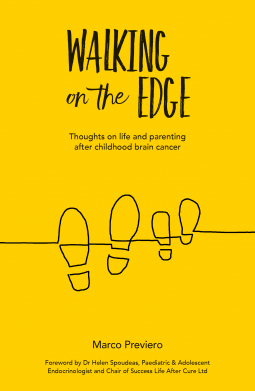
Walking On The Edge
Thoughts on Life and Parenting After Childhood Brain Cancer
by Marco Previero
This title was previously available on NetGalley and is now archived.
Send NetGalley books directly to your Kindle or Kindle app
1
To read on a Kindle or Kindle app, please add kindle@netgalley.com as an approved email address to receive files in your Amazon account. Click here for step-by-step instructions.
2
Also find your Kindle email address within your Amazon account, and enter it here.
Pub Date 28 Jun 2022 | Archive Date 15 Jul 2022
Talking about this book? Use #WalkingOnTheEdge #NetGalley. More hashtag tips!
Description
"Millie was seven years old when she was first diagnosed with brain cancer. To rebuild her physical and mental strength, both significantly depleted following seven months of intensive treatment, Millie and I made a habit of going on regular walks in the countryside. As part of those, we also started talking about her cancer and the limitations that this disease and its cure was going to impose on her life.
"This is the book I wish I'd had when my daughter was first diagnosed.”
Marco Previero covers several aspects of brain cancer and its related treatment in layman’s terms, making it easy to understand for fellow parents facing similar circumstances including; the many practical challenges that parents, and survivors of childhood brain tumours face in the long-term depending on the position of the tumour, its related treatment and cure, how the body copes with therapy, and the level of support available in the recovery phase. He provides an objective exploration and reflection of Millie’s treatment, the limitations it has imposed, and what they found helpful in addressing and managing these during treatment and recovery.
A Note From the Publisher
Marketing Plan
An intensely personal memoir of the author’s daughter’s encounter with brain cancer, the facets of their experiences, during and after treatment, and the agonising choices that had to be made.
Uses the author’s lived experience to show what was helpful in addressing and managing treatment and the limitations imposed as a result, in a practical and understandable way.
Includes foreword written by Dr Helen Spoudeas MBBS DRCOG FRCP FRCPCH MD (Chair of Success Life After Cure Ltd and Paediatric & Adolescent Endocrinologist)
Available Editions
| EDITION | Ebook |
| ISBN | 9781803139401 |
| PRICE | £7.99 (GBP) |
| PAGES | 200 |
Featured Reviews
 Reviewer 823951
Reviewer 823951
I hard and emotional but insightful read….Marco Previero covers several aspects of brain cancer and its related treatment in layman’s terms, making it easy to understand for fellow parents facing similar circumstances including; the many practical challenges that parents, and survivors of childhood brain tumours face in the long-term depending on the position of the tumour, its related treatment and cure, how the body copes with therapy, and the level of support available in the recovery phase. He provides an objective exploration and reflection of Millie’s treatment, the limitations it has imposed, and what they found helpful in addressing and managing these during treatment and recovery.



